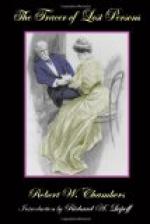As he spoke his language had become very simple, very direct, almost without accent, and he spoke slowly, picking his way with that lack of inflection, of emotion characteristic of a child reading a new reader.
“The column had fallen from its base, eastward, and with its base it had upheaved another buried base, laying bare a sort of cellar and a flight of stone steps descending into darkness.
“Into this excavation the sand was still running in tiny rivulets. Listening, I could hear it pattering far, far down into the shadows.
“Sitting there in the saddle, the thing explained itself as I looked. The fallen pillar had been built upon older ruins; all Egypt is that way, ruin founded on the ruin of ruins—like human hopes.
“The stone steps, descending into the shadow of remote ages, invited me. I dismounted, walked to the edge of the excavation, and, kneeling, peered downward. And I saw a wall and the lotus-carved rim of a vast stone-framed pool; and as I looked I heard the tinkle of water. For the pillar, falling, had unbottled the ancient spring, and now the stone-framed lagoon was slowly filling after its drought of centuries.
“There was light enough to see by, but, not knowing how far I might penetrate, I returned to my horse, pocketed matches and candles from the saddlebags, and, returning, started straight down the steps of stone.
“Fountain, wall, lagoon, steps, terraces half buried—all showed what the place had been: a water garden of ancient Egypt—probably royal—because, although I am not able to decipher hieroglyphics, I have heard somewhere that these picture inscriptions, when inclosed in a cartouch like this”—he drew rapidly—
[Illustration: Glyph]
“or this
[Illustration: Glyph]
indicate that the subject of the inscription was once a king.
“And on every wall, every column, I saw the insignia of ancient royalty, and I saw strange hawk-headed figures bearing symbols engraved on stone—beasts, birds, fishes, unknown signs and symbols; and everywhere the lotus carved in stone—the bud, the blossom half-inclosed, the perfect flower.”
His dreamy eyes met the gaze of the Tracer, unseeing; he rested his sunburned face between both palms, speaking in the same vague monotone:
“Everywhere dust, ashes, decay, the death of life, the utter annihilation of the living—save only the sparkle of reborn waters slowly covering the baked bed of the stone-edged pool—strange, luminous water, lacking the vital sky tint, enameled with a film of dust, yet, for all that, quickening with imprisoned brilliancy like an opal.
“The slow filling of the pool fascinated me; I stood I know not how long watching the thin film of water spreading away into the dimness beyond. At last I turned and passed curiously along the wall where, at its base, mounds of dust marked what may have been trees. Into these I probed with my riding crop, but discovered nothing except the depths of the dust.




